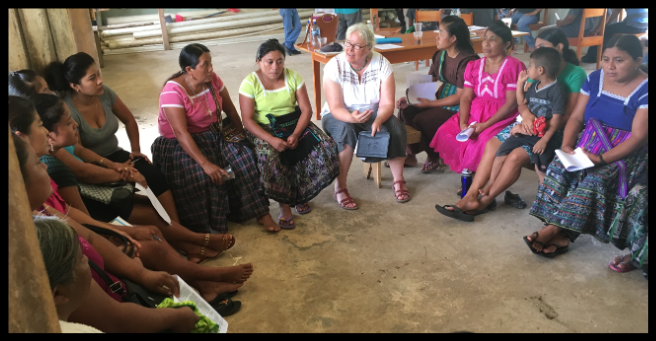Two members of the Rotary Club of Cochrane recently returned from the Toledo District of Belize on a mission to improve and empower the lives of Indigenous Maya people.
The group went to three villages near the Guatemala border – Santa Cruz, Santa Elena and Pueblo Viejo.
Husband and wife, Michael and Judie Bopp, have been Cochrane Rotarians for about four years. They have been lending their expertise in education and development to disadvantaged communities, with a focus on Indigenous peoples at home in Canada and internationally for 40 years. Much of their work is done through their non-profit organization, Four Worlds Centre for Development Learning, founded in the early 1990s.
Their most recent self-funded trip with the Cochrane Rotary saw them partner with the Punta Gorda Rotary Club in Belize to help break down barriers in the lives of its Indigenous Maya people in the south, who are the poorest in the country.
“Information sources from Belize point to the Maya people having, on average, 10 per cent of the income that is average for the country,” Judie said. “So, these communities are also struggling with a number of really significant barriers and they don’t have any land that is their own. They are granted use of the land, but they have no collateral when it comes to trying to engage with banks to get loans or start businesses. They’re really disadvantaged.”
The Maya’s claims, just like the claims of Indigenous peoples in Canada, have gone to the courts and won, Judie said. One of the issues is that the government still has not implemented that decision in Belize.
The Rotary project was aimed at building the capacity of the local Maya people to be able to understand and manage their own development, including how to advocate for themselves and their rights as people.
Michael said that the kind of help that is typically offered in this part of the world comes in the form of relief projects, particularly with church groups, providing housing or “giving stuff.”
“Why don't people have their own houses?," he questioned. "Why do they need us to come there and build their houses? Underneath that need for housing is a whole set of issues around poverty. In working with these villages, we start with those kinds of questions.”
After two separate trips in 2018 and 2019 to assess the needs of the villages and consult with locals, Judie and Michael helped to put together a list of objectives that would assist the Maya to improve agriculture, develop other viable livelihood options, improve the lives of women, enhance infrastructure and strengthen leadership and local development institutions.
The objectives are being carried out through a series of training courses delivered in group settings to help the Maya to understand and identify what development means in their community. The courses expand from there to include fundamentals like how to build and maintain unity and build a business with the help of a small amount of seed money.
“The design of the courses is really that if you’ve taken them, you can give them,” Michael said. “You can start another circle with your family or your friends or your workplace or anybody and bring other people into that process.”
It has been nine months since the project started with the help of a core group of about 40 people on the ground between each of the three villages. Despite COVID-19 constraints here and in the Maya villages, Judie and Michael said it is finding success.
On their most recent trip earlier in September, the Bopp’s said they were struck by the universality of what the youth, farmers, elders and other demographics were able to take away from their learning so far.
“Almost universally, they [the Maya] started out by saying, we learned how to trust, we learned how to be responsible and to persevere and to have courage, to have unity," Judie said. "We learned how to communicate with each other. That's the first thing they started with, not the hard technical skills like how to do a business plan.”
Some of the village youth whose families could not afford to put them through high school were given small stipends from the project, allowing them an opportunity to try and establish their own futures.
The youth decided that they would start a market gardening business that would benefit their community by allowing them to eat healthier and sell the product in a local market. With the profits, the youth would then be able to pay for their school fees.
Rotary Club of Cochrane president Kevin Shier said that the club’s interconnected nature is what makes it so impactful. Lessons are shared to help lift up other communities and as a result, new teachings can also be brought home to implement right here in Cochrane.
“This international work is also directly impacting the work we do locally because it’s all the same process,” Shier said. “It doesn’t matter if it’s the Stoney Nakoda, or if it’s the South Sudanese people in Calgary or someone right here in in Cochrane. The whole process is the same, that’s how we learn and gather information from around the world to bring it back here and do good things locally as well.”




